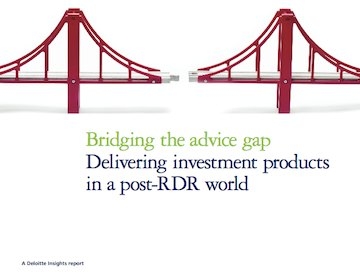'Orphans' are defined as those people who require financial advice but are unable or unwilling to pay for it.
Deloitte questioned over 2,000 adults for the survey, entitled 'Bridging the advice gap', on their attitudes to the RDR.
The four groups most at risk were the disenfranchised wealthy, tech-savvy savers, mass-affluent orphans and mass-market orphans.
Some 16m people own a retail investment product to which adviser charges will apply and half will use an adviser to buy these products.
According to research, 34 per cent of those with more then £50,000 and 33 per cent of those with less than £50,000 said they would stop using an adviser if they were charged directly.
Andrew Power, lead RDR partner at Deloitte, said: "Our research suggests that a third of customers- particularly the less wealthy- could start doing their own Financial Planning, product research and administration to avoid paying for advisers.
"The challenge and opportunity for banks, insurers and fund managers is to bridge the gap by developing business models that allow them to deal directly with customers and by offering streamlined, lower-cost advice."
Seb Cohen, head of insurance research at Deloitte, forecast customers in the advice gap would move online.
He said: "Customers in the advice gap post-RDR with sufficient knowledge of the internet are likely to move online-proactively shopping around. Others are likely to need guidance- some form of human contact- before doing the same.
"Subject to regulatory constraints, there is an opportunity for providers who can cost-effectively deliver this initial guidance to savers who may lack the knowledge to go online and address their financial needs."
• Want to receive a free weekly summary of the best news stories from our website? Just go to home page and submit your name and email address. If you are already logged in you will need to log out to see the e-newsletter sign up. You can then log in again.

